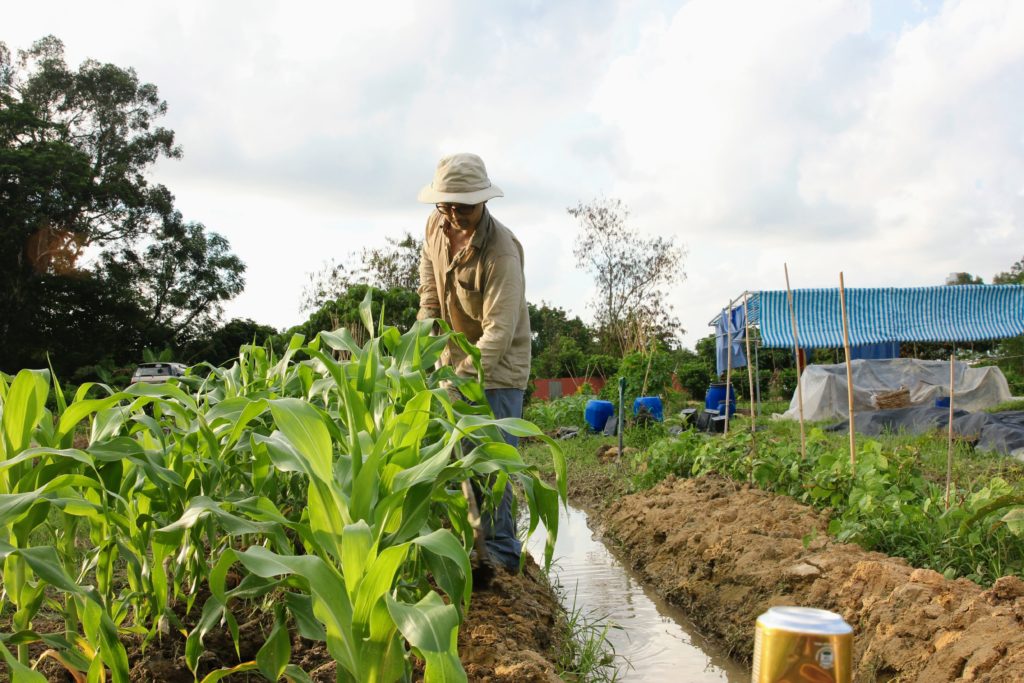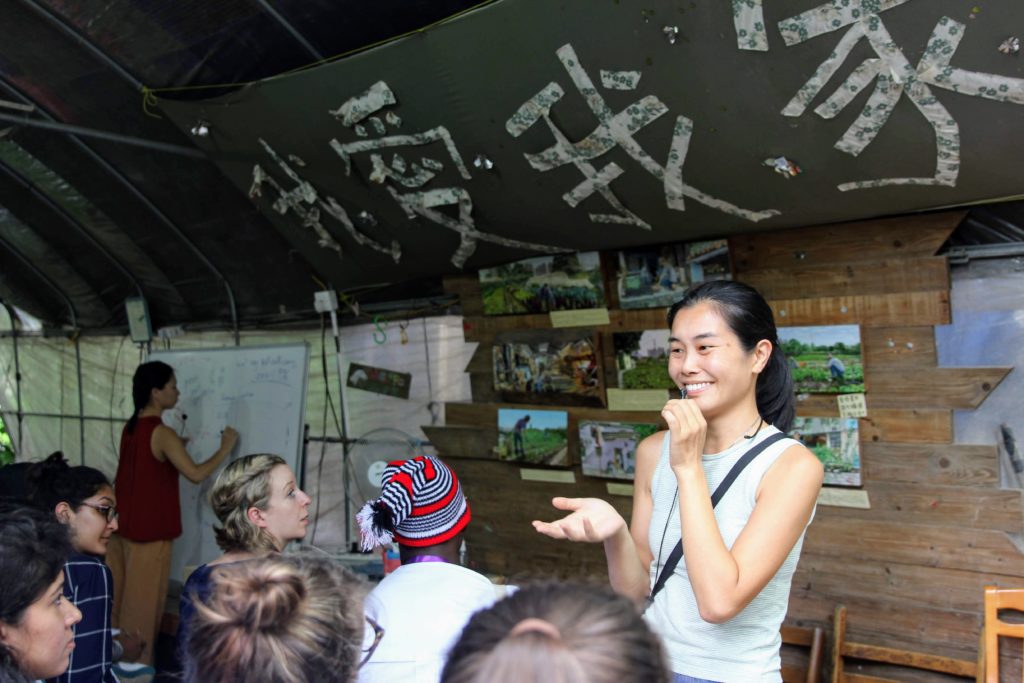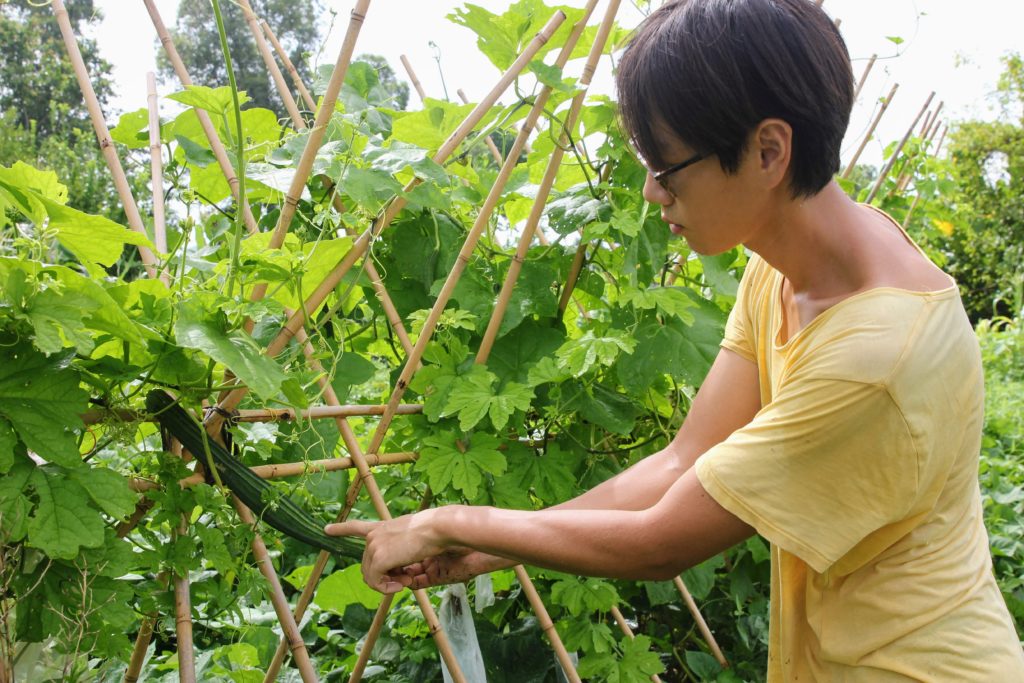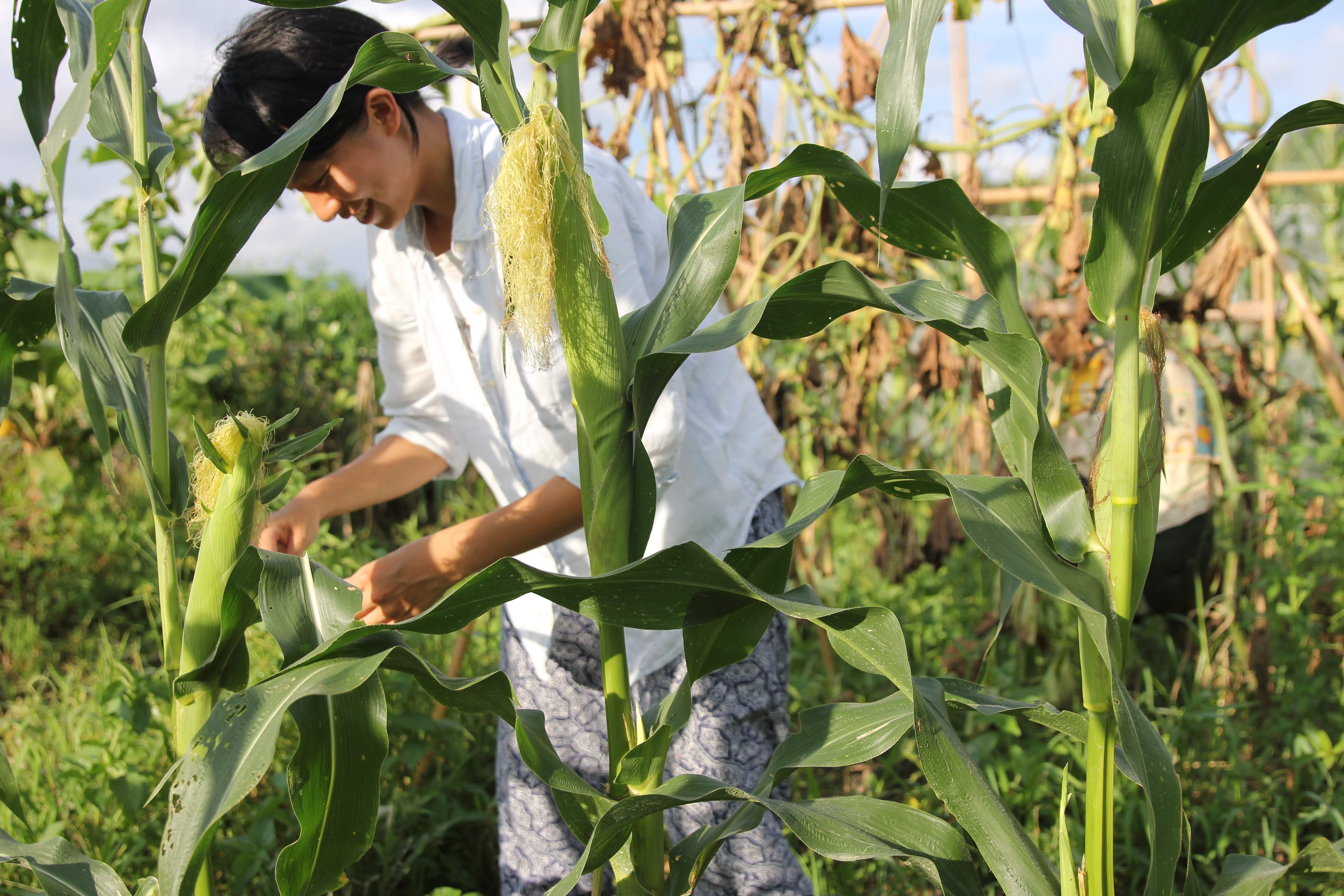Ling Yin Kung arrives at the Society of Indigenous Learning, a 30,000-square-foot community farm in Sheng Shui, at 9am most mornings to begin picking vegetables.
The 29-year-old earns half as much as he did in his previous job as a flight attendant, and he’s usually exhausted after a full day of hand-watering plants and packing deliveries. But to him, changing the way people eat in Hong Kong, a city that imports over 90 percent of its food, is worth the trade-off.
“I wanted to find a way to be more self-sufficient at that time, and to know more about real food in the world — not McDonald’s or KFC,” he said.
“I can’t buy a flat,” Kung, who lives with his family, added. “But this is why I say, ‘Are you spending your whole life just to buy a flat in Hong Kong?’”
Kung is part of a new generation of college-educated farmers in Hong Kong — few of whom have experience working in the dirt — who are trading in their white collar lives for long hours of manual labor outdoors.
Some are disillusioned with sterile office work, some are going back to the land hoping to protect a disappearing way of life, while others simply want something more personally meaningful.
While definitive government figures aren’t available, Kung estimates that about 100 young people are currently putting in at least part-time hours on farms around Hong Kong. They face a decidedly uphill battle in a city where property developers are gobbling up land at record-breaking prices. But those willing to take on the challenge are bringing new life to local agriculture, and could potentially slow the industry’s decades-long decline.
In Sheng Shui, Fai Hui is one of the farmers proving it can be done. The 47-year-old spent nine months cultivating relationships with local villagers before finding a 35,000-square-foot plot to set up Wildroots Organic Farm, a green expanse with mountains visible in one direction and high-rises in the other. Hui now splits his time between his farm and the city, where he teaches workshops to university students and consults on rooftop farm projects.
When Coconuts HK visited on a recent weekend, Hui was crouching between rows of young corn plants, spade in hand, piling soil around the base of each stalk. He often works alongside trainee farmer Kit Wong, 38, a freelance graphic designer who said he wanted to be closer to nature after years of eight-hour days in front of a computer, and Angeline Chan, 26, another trainee farmer, who plans to quit her job as a lawyer and continue apprenticing at the farm.

They’ve gotten to know the farmer next door, who, like most of Hong Kong’s farmers, is elderly — a holdout from the days when agriculture thrived — and whose kids didn’t want to take over.
Even though his neighbor doesn’t share his organic methods, Hui said that the knowledge he’s cultivated over decades of growing Asian greens and flowers is priceless. Young farmers like Kit and Angeline are the only hope for preserving it.
“No one in his family is picking up the know how, and he will retire in a couple of years,” Hui said. “It’s not the same, but at least we try to learn from him.”
The growing interest in keeping local agriculture alive is also evident at Mapopo Community Farm in Ma Shi Po, a village in the New Territories town of Fanling. About 400 people have taken classes in organic farming methods there since the farm opened in 2010.
The students come from all walks of life, according to TV Yuen, who teaches the classes.
The 53-year-old added that many of them question their career choices after putting in long hours at corporations, without promotions or raises. Pausing for several seconds, he then added matter of factly, “You have people saying that the city sucks.”
Others, like Mapopo co-founder Becky Au, view farming as a way to take back the land from the city’s all-powerful property developers.
Difficulty finding land, of course, Yuen said, is one of the major reasons that just an estimated 25 percent of his students actually end up going into farming.
Only four percent of Hong Kong’s land is still zoned as agricultural, and less than 16 percent of that is actively farmed, according to the government. Most people in the industry say the city’s intense real estate market and hostile government policies are to blame.
Most of it is abandoned, Yuen said, partly because landowners would rather wait for property developers to come knocking with billion-dollar offers than they would lease the land to a farmer.
Over the years, property developers have snapped up 1,000 hectares of agricultural land they have yet to build on, per the government’s Task Force on Land Supply. With property prices at record highs and families waiting more than five years for limited public housing, the government is looking at ways to convert, not preserve, this farmland into residential areas.
Farmers in the New Territories — most notably in Choi Yuen, a village that was demolished in 2011 to make way for a high-speed railway linking Hong Kong and Guangzhou — have been fighting against land-grabbing for years. Most are non-indigenous settlers from mainland China who started cultivating crops in the 1950s.
Becky Au, 33, whose family has farmed in Ma Shi Po for three generations, said she was devastated when Henderson Land Company, the property developer that owns the land, attempted to re-possess parts of her village in 2007.

She recalled watching as her neighbors in Ma Shi Po were evicted.
“I saw so many people taken from their homes,” she said. “I was so sad.”
Au quit her job as a clerk in the city, and worked with other activists to convert her parents to organic farming, turning their plots into Mapopo Community Farm in 2010. Her brother Ho-man also quit his office job to farm with their father.
She said her parents were skeptical at first. “They said, ‘You come to farm with us? We can’t earn a living for you as well,’” she recalled, laughing. “I said ‘No, I will take care of myself.’”
Au now coordinates orders for produce and weekly markets in Ma Shi Po, and helps lead tours of the village.
“We want to tell the story of farmland in Hong Kong,” she said. “We want to tell people how important it is.”
Her fight against Henderson came to a head in 2016, when the company tried to clear another piece of the village — this time, a part of her family’s farm, which included the first plot that her grandparents farmed when they arrived in Hong Kong sixty years earlier.
Villagers and protesters occupied the site for weeks, erecting barricades and sitting on top of bulldozers, until a court sent in bailiffs to remove them by force ahead of the deadline that would allow developers to re-zone the land for residential development.
During a recent tour of the village, Au and fellow activist Kaikai Cho told a group of about 30 students and academics visiting from overseas that the farm continues to operate on other plots. When one member of the group asked what she’ll do if the company decides to re-possess that land, too, Au simply answered: “The plan is to fight.”
Dr. Kwai Cheong Chau, an agricultural science expert and former member of Fanling’s town planning board, said that he expects plenty of similar fights down the road, especially since the government recently launched a consultation to seek public opinion on how to boost Hong Kong’s supply of land for housing. One of the 18 options it put forth was tapping into developers’ reserves of agricultural land in the New Territories.
It’s unfortunate, Cheong said, because he doesn’t believe new developments have to come at the expense of farmland.
“Instead of paving farmland, starting from scratch and building a commercial business district and housing, we can have an innovative design to integrate towns and farmland,” said Cheong, who is the son of farmers himself.

He said he once suggested the idea to his fellow town planning board members, but they ignored it.
All this, combined with competition from cheaper, conventionally grown produce and the difficulty of achieving a successful harvest, makes Cheong think that young farmers will have a tough time if they hope to earn a living solely from selling produce.
Ling Yin Kung doesn’t deny this. Back at the Society of Indigenous Learning’s farm, the 29-year-old stood nearby as another farmer ushered a group of visiting middle school students through the farm’s gate.
“Many of us in this generation have to do so many activities to sustain ourselves,” he acknowledged. “Every farmer spends half their time growing veggies, and half doing other things.”
But it hasn’t deterred his dreams of opening his own farm and living on it one day.
Kung said he thinks that, with luck, he’ll be able to find a piece of abandoned land through his connections with villagers. He said he’d like to open a cafe on the premises, and serve people locally grown, organic food.
He said he’s hopeful, because he doesn’t believe that Hong Kong’s urbanization has to mean the end of farming.
“Farming and the city are not two enemies,” he said, as he checked on a pile of compost made of tree clippings brought in from Kowloon. “They need each other.”
Correction: An earlier version of this article misstated Kit Wong’s surname as Chan.


